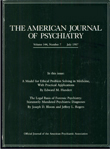The Psychology of Religion and Coping: Theory, Research, Practice
For most of the twentieth century, religion has taken its lumps. Freud infantilized it. Communism decried it. God never has appeared to the ever-waiting Godot. Philosophers and even some theologians, especially after Auschwitz, have said that God is dead. Sin has been transformed into criminality and mental illness. In recent years, however, religion has been hot and spirituality even hotter. Jesus is on the cover of news magazines. Angels, the newly acclaimed social workers of the universe, suddenly are everywhere. Religious healers promise to cure “artheritis” and “old timer's disease” anytime, anywhere; all you need is a television set and a credit card. Books and articles boldly announce that people who attend church and pray live longer, healthier lives. Can this be true or too good to be true?
Kenneth Pargament, a professor of psychology at Bowling Green State University in Ohio and a recipient of the American Psychological Association's William James Award, has written a massive, scholarly, even-handed, level-headed book on religion and coping from a psychological perspective. His book does not compare major religious traditions but, rather, focuses on the pivotal periods where religion meets crisis and people are put to the test. Pargament notes that psychology and religion have become rivals; in place of confession, conversion, sins, and virtues, we have psychotherapy, personal growth, and ethics. Yet, the differences are not irreconcilable. “What psychology can offer are important insights into the footprints left by religion. These insights do not speak to religion's truth, but they do help us understand its manifestation and insights” (p. 10).
The strength of the book is its meticulous, almost plodding, step-by-step examination of what religion means and what coping means and how the two interact. A 57-page appendix neatly lists more than 250 pertinent studies with information about the sample, methods, and results. Original data are supplied from the author's own Project on Religion and Coping, in which comprehensive batteries of religious coping measures were administered to several hundred members of Protestant churches and Roman Catholic parishes who had experienced major stressful life events within the past year.
Since I cannot do justice to the intricacies of the book in the space of a brief review, I shall skip to some conclusions. First, results of research on the relationship between religious orientation and the outcomes of negative events “provide only modest evidence for the value of religion on stressful situationsIn fact, most of the time (62% of the cases), religion appears to be unrelated to the outcomes of negative events. Moreover, this pattern of results seems to hold true regardless of which aspects of religious orientation are being studied” (p. 283).
To the question, “Is religion helpful, harmful, or irrelevant in coping?” the author's answer is yes. “Religious coping is all of the above” (p. 286). He also says, “Specific forms of religious coping may be particularly effective stress buffers for particular groups faced with particular kinds of problems” (p. 306).
These conclusions are hardly ringing endorsements for religious coping. Indeed, Pargament notes, “On the face of it, people appear to be able to cope as effectively without religion as with it.” However, he goes on to demonstrate that in within-group studies, people give religion more favorable ratings than other coping strategies. Religion undeniably adds a unique dimension to the coping process and seems to be especially helpful to more religious persons who have less access to secular resources and power in our culture, such as the “elderly, poorer, less educated, blacks, widowed, women” (p. 301).
This is a very fair and respectful book; despite its proreligious stance, it contains an insightful chapter entitled “When Religion Fails.” The book sets a new standard of excellence for works on religion and psychology. Although it lacks any biological or psychiatric focus, I highly recommend it to colleagues who desire to organize their thoughts about religion.



